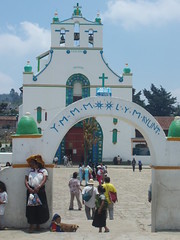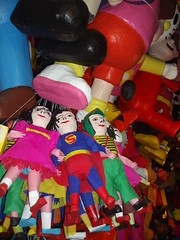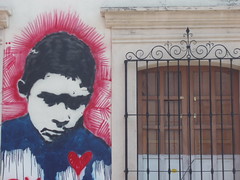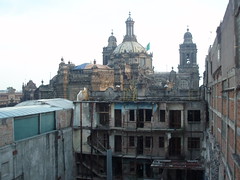Noise
Mexican life is loud. Music comes from every shop, every house, every taxi. It´s not unusual to see massive sound systems in supermarkets, corner shops, hairdressers and particularly in pharmacies. The pharmacies of San Cristobal de las Casas give the local nightclubs a run for their money as dusk descends and they crank up the banda music. They even put on a light display and there is a guy permanently stationed outside, dancing in a huge foam costume in the sun. People shout at one another over the racket and cars have to honk especially loudly to warn pedestrians bewildered by conflicting dance tunes. When you visit the mayan sites, the guides like to demonstrate the amazing ancient acoustics by making more racket, giving ostentatious displays of clapping, and Mexican tourists warm to the idea and bellow to their infirm, grounded relatives from the tops of the temples. Take a video of us standing still on top of this pile of rubble, mama. It´ll make great viewing back for the folks back home. Merida was quite possibly the noisiest city on earth, the hubbub amplified by the cavernous avenues, great corridors conducting sound, and the cobbled streets.
Mexican conversations
There is a definite pattern to the conversations I have had in Mexico. Most of these have been with taxi drivers or men who have fallen into step with me walking down some city street. This seems to be how my interlocuters have approached things:
Establish nationality
Establish level of Spanish comprehension
Establish suitable level of appreciation for present location
Discuss linguistic ineptitude of Anglophone visitors and importance of having a go at the beautiful, and widely spoken Spanish language
Issue proposal of marriage
Issue proposal of polygamous marriage
Optional - congratulate Dan on his general good fortune
Obtain assurance of Meso-American cultural superiority
Proceed with business of selling hammock/poncho/garishly coloured sombrero
Mexican pavements
Lethal death traps. A way of keeping the population at reasonable levels. Obviously not working in Mexico City but if they can get rid of a few flip-flop wearing tourists, then all to the good. Sometimes, if you stand at the edge of the pavement at a crossroads, on the part that slopes to the road, you slide all the way into the gutter. As it´s now officially the rainy season, the situation has reached one of constant peril. All our shoes are useless in the face of the greasy, slick marbled walkways. We cling to each other as we stagger around the towns, hoping if we fall, we´ll land in a friendly fruit stall and not in the great, suspiciously grey lakes the streets have become.
And the pavements are so uneven, so narrow, so full of junk and rubble and stray, unsightly animals. Do you look at the exotic Mexican buildings, or keep your eyes to your feet? Last week we saw a dead kitten on the pavement, laid out as if sleeping, drying out in the sun.
The wildlife
I´ll start with the exotic. Iguanas. I´m not a huge fan of reptiles but can cope with lizards if they are small and not touching my feet. Have positively affectionate feelings towards geckos, they made good companions in South East Asia. I appreciate the iguana, it is a strange and fine creature. They do like to hang out near ruins, nonchalantly creeping out the tourists. At the Mayan ruins at Uzmal, there are more iguanas than tourists, or so you´d like to think. More iguanas than the plastic bottles left behind by the tourists. They lie in the sun, stick themselves to the trunks of trees, sit on the temple steps, and skitter about when the tourists come near. They move as if they´re trying to make everyone around them laugh, opposite front and back leg off the ground at the same time and then a quick change and for a second, it seems like they´re completely airborne. You might come across the end of a tail, sticking out of a crack in a temple wall. Sometimes it will have an owner as the discarded ones dry quicky in the sun. So much bigger is man and so much scarier than an iguana. But my instinct tells me otherwise and I wouldn´t hesitate to use Dan as a ladder if one came too near me. He said he saw one as long as his arm, and as fat as the burritos we ate in San Francisco. I wasn´t looking, but I practised my bunny hop to make sure I could perform the piggy back when the time came. In Tulum, they´ve the biggest iguanas of all the ruinas or so I overheard someone say at breakfast one day.
For something more domestic, there are dogs, in great numbers. Mainly mangy, flea-ridden creatures, all destined to be harbingers of rabid doom in weeks to come. All exhausted by life in Mexican cities and so seen in various states of collapse in the middle of the road, under cars, on roofs. Those that are not exhausted are all evil rotweiler/doberman/dog of hell crosses, guarding private places with all their might, and certainly, every last bit of bark. All these dogs follow me. We´ve regularly tried to outwalk a mangy mutt, but they always reappear, lurking nearby, stopping by our bench to lick their nether regions or sniffing at the backs of our ankles at a bus stop.






